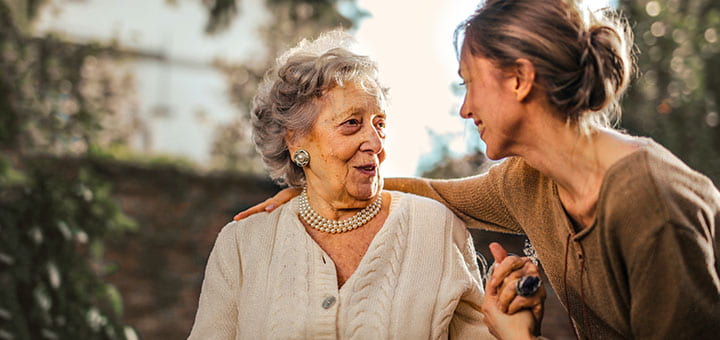A MEANINGFUL CIRCLE
Emotional intelligence (EI) has long been embraced by the business community, and leaders are coached to enlarge their empathy and understanding of employees in order to address fundamental interpersonal and emotional needs in the workplace.
But does EI help in caregiving? It turns out yes.
That was the result of a multi-year caregiver study conducted by Dr. Dafna Hadar-Pecker.
She found that EI enabled professional caregivers to achieve a higher level of understanding, and consequently offer a better degree of care.
Caregivers with high EI are not immune to the negative aspects of their profession: the day-to-day need to cope with difficult issues and the physical and emotional pain.
However, caregivers with higher EI were able to avoid compassion fatigue and were more successful experiencing “compassion satisfaction.”
Says Hadar-Pecker, “EI is a tool that tells [caregivers] it’s okay to feel something deeply because you are doing something that is meaningful and valuable, and as a result it helps the treatment programs. It becomes a kind of circle.”
Further, she says, “An individual with high EI knows how to create a strategy to navigate through the negative aspects and positive aspects.”
What is Emotional Intelligence (EI)
EI is generally understood to mean the ability to comprehend and manage our emotions while simultaneously understanding the emotions of others.
For caregivers and other healthcare workers, emotional intelligence can be categorized into four areas of particular importance: self-awareness, self-management, social awareness and relationship management.

Self-Awareness – Far from being self-indulgent, self-attention and self-care are essential, so that you can continue to help and serve.
Ask yourself:
- Am I aware of my emotions?
- Am I aware of how I am expressing them and impacting others?
- What is the tone of my self-talk?
- Are my basic human needs being met?
Self-Management – Becoming more aware of your emotions and how you’re expressing them gives you the information you need to better manage your responses.
Ask yourself:
- Do I have effective way to navigate emotional triggers?
- What is within my zone of control?
- Am I making time for sleep, nutrition, and exercise?
- Do I have a support network and do I give myself permission to lean on it?
- What brings meaning and purpose to my life?
Social Awareness – Taking care of yourself is what allows you to take good care of others.
Ask yourself:
- Do I listen to others first to understand rather than rush to respond?
- Can I identify and name others’ emotions accurately?
- Whose work haven’t I recognized?
Relationship Management – While social awareness is tuning into others, relationship management is using this awareness to have successful interactions with them.
Ask yourself:
- Am I bringing extra patience, and assuming the best about others?
- As a caregiver, am I being transparent with information?
- Are my communications frequent, clear, and open to feedback?
- Am I going slow at key moments, including moments of thanks?
When caregivers cultivate higher EI, they feel more rewarded by their work, and the patient is the ultimate beneficiary.
*
Cultivate Empathy and Understanding
Wisconsin Caregiver Academy has created two specialized online live courses to enable you to learn how to honor the needs and desires of your patients. “Negotiated Risk Agreements: Balancing Risk, Responsibility & Rights” takes place on Thursday, November 12 from 9-11 a.m. “Clearing the Muddy Waters of Individual Service Plans and Assessments” takes place in two parts: Thursdays December 3 and December 10, from 8 a.m.-12:30 p.m. Learn more and register. With enhanced awareness and communication comes enhanced care.
*
RESOURCES:
Caregivers, Caregiving and Emotional Intelligence, Open Letter, The Open University of Israel.
How Health Care Workers Can Take Care of Themselves, Harvard Business Review, David P. Fessell and Daniel Goleman, May 20, 2020.
Why Emotional Intelligence is Vital for Remote Workers, Josh Millet, Forbes Human Resources Council, September 30, 2020.









